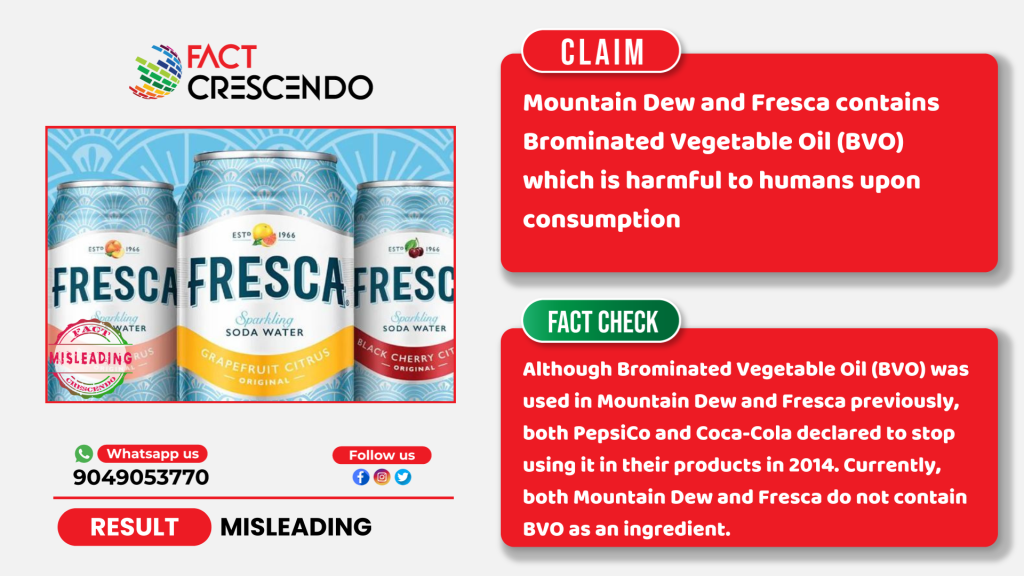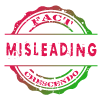
Currently, a social media post claiming that both Mountain Dew and Fresca soda drinks are banned in Europe and Japan as they contain Brominated Vegetable Oil (BVO) as an ingredient. BVO contains bromine which leads to Attention Deficit Hyperactivity Disorder (ADHD), Autism, Memory loss, and Nerve issues.
However, Fact Crescendo found the claim to be misleading. Mountain Dew and Fresca product of PepsiCo and Coca-Cola were previously using BVO. But in 2014 both the brands declared to stop the use of Brominated Vegetable Oil (BVO).
What’s the claim?
Users are claiming that Mountain Dew and Fresca are two popular sodas that are banned in Japan and the European Union because they contain brominated vegetable oil (BVO). Mountain Dew and Fresca contains BVO, which is used to prevent ingredients from separating. BVO is banned in these regions because it contains bromine, an element found in flame retardants. Studies have linked exposure to flame retardants to: Attention Deficit Hyperactivity Disorder (ADHD), Autism, Memory loss, and Nerve issues.
Fact Check-
First, we tried to find out whether Mountain Dew and Fresca, product of PepsiCo and Coca-Cola respectively, contains Brominated vegetable Oil (BVO).
We found that Mountain Dew contains carbonated water, high fructose corn syrup, concentrated orange juice, citric acid, natural flavor, sodium benzoate (preserves freshness), caffeine, sodium citrate, gum arabic, erythorbic acid (preserves freshness), calcium disodium edta (to protect flavor), and yellow 5.
Similarly, Fresca contains carbonated water, citric acid, concentrated grapefruit juice, potassium citrate, aspartame, potassium sorbate (to protect taste), acacia gum, acesulfame potassium, natural flavors, glycerol ester of rosin, potassium benzoate and calcium disodium edta (to protect taste), carob bean gum.
In 2014, NPR reported that Coke and Pepsi announced they would stop using Brominated Vegetable Oil (BVO) in their drinks after a teen’s petition labelled it a “fire retardant chemical.” Although BVO itself isn’t a fire retardant, its safety hasn’t been thoroughly studied. The FDA has allowed limited use of BVO while waiting for more safety data, but its chemical-sounding name and association with bromine, a toxic element, have raised concerns. Now, the companies will replace BVO with safer alternatives like sucrose acetate isobutyrate or glycerol ester of rosin.
On 3 July 2024, FDA declared that it no longer allows for the use of brominated vegetable oil (BVO) in food. The agency concluded that the intended use of BVO in food is no longer considered safe after the results of recent studies conducted in collaboration with the National Institutes of Health (NIH). The research results showed the potential health risks, such as effects on the thyroid and bromine buildup in tissues.
According to New York Post, in 1970s FDA removed BVO from the Generally Regarded as Safe List and restricted its use to only fewer products. Brominated Vegetable Oil (BVO) was banned in the United Kingdom in 1970, followed by India in 1990, the European Union (EU) in 2008, and Japan in 2010. But companies like Coca-Cola and PepsiCo had already removed BVO from their products.
Conclusion:
Although Brominated Vegetable Oil (BVO) was used in Mountain Dew and Fresca, but both PepsiCo and Coca-Cola declared to stop using it in their products in 2014. Currently, both Mountain Dew and Fresca do not contain BVO as an ingredient.

Title:Mountain Dew and Fresca do not contain Brominated Vegetable Oil (BVO) as an ingredient and are not banned in Europe and Japan.
Fact Check By: Siddharth SahuResult: Misleading


